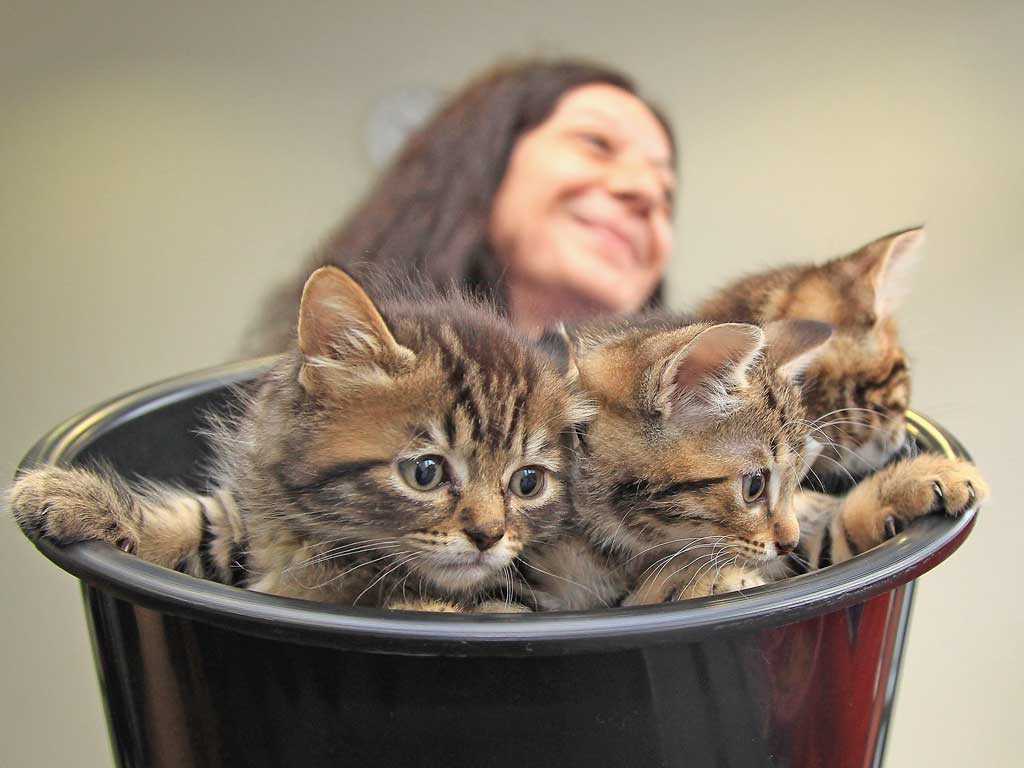Trending: Why we're cool for cats
We give them silly names, love to watch their antics and attach human characteristics to them. What is it about cats that makes them the most popular animals on the net?

In this month's New Humanist magazine, the venerable gonzo illustrator Ralph Steadman describes cats – quite accurately and rather wonderfully – as "purring sycophants with an agenda". Steadman's Book of Cats – out tomorrow – features a selection of Steadman's scabrous portraits of a species he claims to dislike, but clearly, reading the New Humanist piece, admires (he had a cat called Tishy).
His take on moggies is a more cynical one than that of astronomer Sir Patrick Moore, whose recent book Miaow! Cats Really Are Nicer Than People! may well be one of the soppiest things you'll read all year.
If even curmudgeons such as Steadman and Moore are moved by the presence of cats in their lives, then it's no wonder that the rest of us are just as giddy.
The internet is full of the hairy little blighters. Their presence comes in many forms. It can be from cat tragics like me filling up their social networks with pictures of their mog in an unusual position (you can see mine, Yoko, on her green bean-bag, above). Then there are galleries of cute kitties – viral site Buzz Feed recently opened a specialist animals-only site ("Cat Family Portraits", anyone?). Perhaps most famous is Lolcats, the caption + kitty phenomenon that's allowed its pioneers, the Cheezburger Network, to become a company that, in early 2011, pulled in almost £20m-worth of venture-capital funding.
We like cats. Elderly astronomers couldn't live without cats. The internet loves cats. But why have cat pictures and videos become a mainstay of the internet and the default way for us to waste time?
Jack Shepherd, the founder of Buzz Feed – who jokingly announced upon the launch of BuzzFeed Animals that "most sensible people with computers spend their workdays scouring the web for baby-panda slide shows and breaking cat-video news, but this is actually my job" – tried to do the maths last week with an exhaustive piece asking why internet users preferred felines to canines.
Shepherd, who probably knows more than most about this kind of thing, drew several conclusions for online kitty popularity: the self-perpetuating culture built up by the initial rise in Lolcats and how it helped sites such as Cheezburger and 4chan to establish their community identities.
Shepherd also suggested that cats' cool demeanour helps. Dogs, he reckons, "are the equivalent of a 'viral marketing strategist' at an ad agency". Cool cats, on the other hand, get in a cardboard box because "it suddenly felt like the right thing to do".
Another theory – from Cheezburger editor Emily Huh – is that the internet provides a digital dog park for cat owners who can't normally interact to share the delights of their pet.
A University of Sussex study in 2009 suggested that cats are smart enough to know how to make their miaows sound like human baby cries in order to funnel our nurturing instincts into feeding them. A similar – but non-proven – theory was shared with me recently: we like looking at kitties and their big, wide eyes because they remind us of babies. So, next time your line manager leans over your shoulder as you're looking at a gallery of "30 Cats Hanging in Shoes", just tell them you're taking a five-minute break to hone your nurturing instincts. How could they argue?
Watch the 'Cat alarm clock' which went viral last week, above
Join our commenting forum
Join thought-provoking conversations, follow other Independent readers and see their replies
Comments
Bookmark popover
Removed from bookmarks